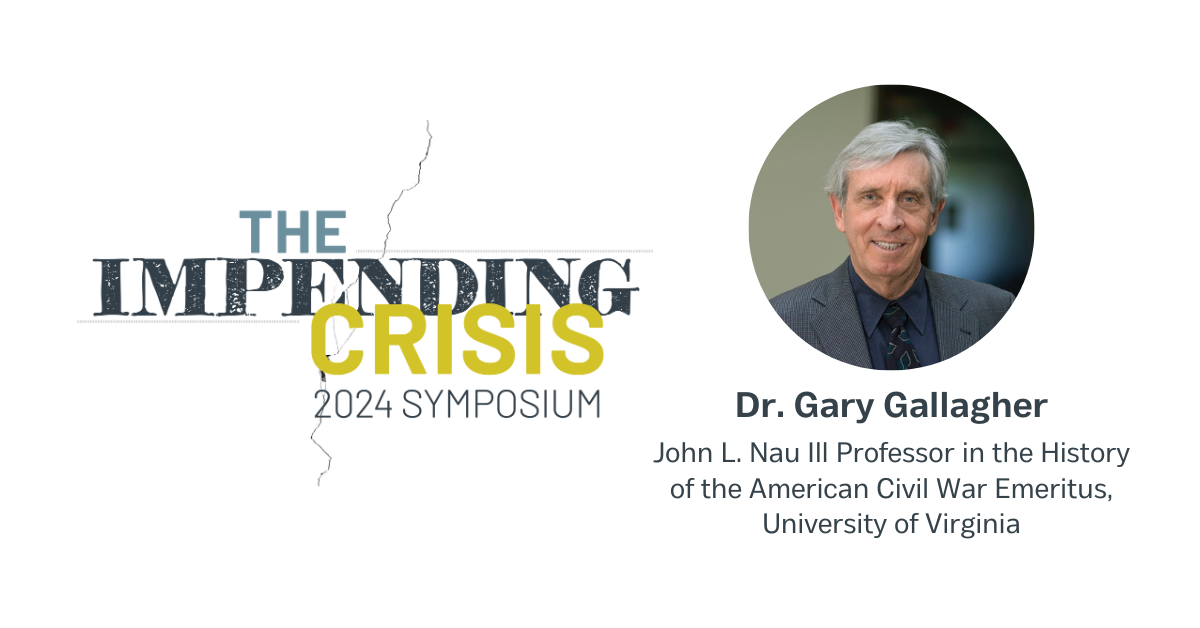
Dr. Gary Gallagher
John L. Nau III Professor in the History of the American Civil War Emeritus, University of Virginia
Gary W. Gallagher received his B.A. from Adams State College of Colorado (1972) and his M.A. (1977) and Ph.D. (1982) from the University of Texas at Austin. He began his academic career in 1986 at Penn State University, where he taught for twelve years. In 1998, he joined the faculty of the University of Virginia and held the John L. Nau III Professorship in the History of the American Civil War and served as the founding Director of the John L. Nau III Center for Civil War History. He is the author or editor of more than fifty books, including The Confederate War (Harvard, 1997), Causes Won, Lost, and Forgotten: How Hollywood and Popular Art Shape What We Know About the Civil War (UNC, 2008), The Union War (Harvard, 2011), The American War: A History of the Civil War Era (co-authored with Joan Waugh; Spielvogel Books, 3rd ed., 2023), and The Enduring Civil War: Reflections on the Great American Crisis (LSU, 2020). He has served as editor of three book series at the University of North Carolina Press (“Civil War America,” with more than 115 titles; “Military Campaigns of the Civil War,” 10 titles; and “The Littlefield History of the Civil War Era,” 15 titles) and appeared regularly on the Arts and Entertainment Network’s series “Civil War Journal” as well as participating in more than five dozen other television projects in the field. He held the Cavaliers’ Distinguished Teaching Professorship in 2010-2012 (the highest teaching award conveyed by the University of Virginia) and won the Philip Merrill Award for Outstanding Contributions to Liberal Arts Education from the American Council of Trustees and Alumni in 2013. Active in the field of historic preservation, he was president from 1987 to mid-1994 of the Association for the Preservation of Civil War Sites and also served as a member of the Board of the Civil War Trust, now the American Battlefield Trust.

February 17, 2024
Was the Civil War an Irrepressible Conflict?
2:20 PM – 3:20 PM
The prewar decades were a tremendously complicated period. In addition to the politics of slavery and the notion of two co-existing cultures within one constitutional framework, there was a revolution in communication and transportation, demographic changes, and westward expansion. Going beyond the sectional factors helps place the question of the war’s inevitability in broad context.
Past Events with the ACWM
Featured Products

Civil War: Fort Sumter to Appomattox
This book explores the political, historical, and cultural significance of the Civil War, AKA the War Between the States, examining its impact on the civilians and military personnel caught up in it. From the Civil War’s outbreak at Fort Sumter, South Carolina in April 1861 until its conclusion at the Appomattox Court House, more than 10,000 battles, engagements and skirmishes were recorded across the length and breadth of America. Undoubtedly the most cataclysmic military struggle of the late nineteenth century, this war spanned four bloody years of fighting in which over 620,000 American soldiers and sailors lost their lives.

Leaders of the Lost Cause: New Perspectives on the Confederate High Command
This exciting and groundbreaking collection of essays looks at the lives and command decisions of eight Confederates who held the rank of full general and at the impact they had on the conduct, and ultimate outcome, of the Civil War. Old myths and familiar assumptions are cast aside as a group of leading Civil War historians offers new insight into the men of the South, on whose shoulders the weight of prosecuting the war would wall.

The Myth of the Lost Cause and Civil War History
Was the Confederacy doomed from the start in its struggle against the superior might of the Union? Did its forces fight heroically against all odds for the cause of states’ rights? In reality, these suggestions are an elaborate and intentional effort on the part of Southerners to rationalize the secession and the war itself. Unfortunately, skillful propagandists have been so successful in promoting this romanticized view that the Lost Cause has assumed a life of its own. Misrepresenting the war’s true origins and its actual course, the myth of the Lost Cause distorts our national memory. In The Myth of the Lost Cause and Civil War History, nine historians describe and analyze the Lost Cause, identifying ways in which it falsifies history―creating a volume that makes a significant contribution to Civil War historiography.

The American War: A History of the Civil War Era
Renowned historians Gary W. Gallagher and Joan Waugh provide a fresh examination of the Civil War, its aftermath, and enduring memory in a masterful work that prize-winning historian William C. Davis calls, “easily the best one-volume assessment of the Civil War to date.” Nothing had prepared Americans for the fury that ensued when eleven slaveholding states seceded and formed the Confederacy in 1860-1861. Four years of fighting claimed more than 1.4 million casualties, directly affected the lives of hundreds of thousands of civilians, and freed four million enslaved black people. The durability of the Union was confirmed, and the social and economic system based on slavery lay in ruins. By investigating this crucial period through the eyes of civilians, celebrated leaders, and citizen soldiers, readers interested in the Civil War era will gain a profound understanding of the dramatic events, personalities, and social and economic processes that caused the war, enabled the Union to prevail, and forever transformed the United States. It also will help readers understand why, more than 150 years after Appomattox, it remains impossible to grasp the larger sweep of U.S. history without coming to terms with the American War.
